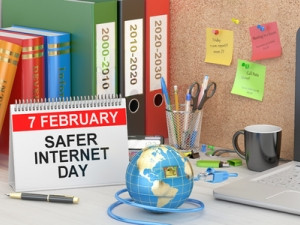
Today is Safer Internet Day (SID), a day dedicated to making the Internet a safer and better place for all, especially children and young people. This year's theme is 'be the change: Unite for a better Internet'.
In line with this, Microsoft has challenged people globally to embrace "digital civility" by treating one another with respect and dignity on the Internet. Last year, the company conducted research among adults and teenagers in 14 countries to study the level of civility across various online interactions. The results examine the extent of negative civil and personal safety interactions and their consequences.
South Africa came 14th in the Digital Civility Index, making it the country with the highest online risk exposure and lowest degree of digital civility out of all the nations surveyed. These included Australia, Germany, India, France, the UK and the US. The survey polled teens (13-17) and adults (18-74), asking about their experiences and encounters with 17 different online risks across four categories, namely behavioural, reputational, sexual and personal/intrusive.
Contributing to South Africa's poor result was that 78% of participants surveyed reported having been exposed to an online risk, which exceeds the international averages for both intrusive and behavioural risks. Moreover, South Africans encountered reputational risks more often than international (22% vs 18%). This was led by doxing (14%) and damage to personal reputation (11%), the research found. Doxing is the practice or researching and then broadcasting private information about someone online.
Microsoft has initiated as a four-step "Digital Civility challenge" in conjunction with SID, to combat the problem. The goal of the Challenge is to pledge to every day live up to the four Digital Civility Challenge ideals:
1. Live the Golden Rule. I will act with empathy, compassion and kindness in every interaction, and treat everyone I connect with online with dignity and respect.
2. Respect differences. I will appreciate cultural differences and honour diverse perspectives. When I disagree, I will engage thoughtfully and avoid name calling and personal attacks.
3. Pause before replying. I will pause and think before responding to things I disagree with. I will not post or send anything that could hurt someone else, damage my reputation, or threaten my safety or the safety of others.
4. Stand up for myself and others. I will tell someone if I feel unsafe, offer support to those who are targets of online abuse or cruelty, report activity that threatens anyone's safety, and preserve evidence of inappropriate or unsafe behaviour.
Teacher engagement manager for Microsoft SA, Angela Schaerer believes it should be everyone's responsibility to practise digital civility and that it should be everyone's aim to be accountable for their behaviour online. She encourages South Africans to be role models and champions for others. "Embracing digital civility will give us an opportunity for a digital reset - a time to take stock of online habits and practices to ensure we're putting our best digital foot forward and in doing so it will make it easier to establish and help foster safe as well as inclusive interactions online."
As part of its SID initiative, Facebook says it has partnered with public sector agencies and non-governmental organisations from across Africa. Public policy manager at Facebook Africa, Akua Gyekye, says nothing is more important to it than the safety of the people who use its service. "Every day people come to Facebook to connect with people and issues they care about, and they should be able to do so in a safe, secure environment."
"It is important to have conversations early and often about how inappropriate content on the Internet may affect children," says Janine Raftopoulos, manager communications and public education of South Africa's Film and Publications Board, which is one of Facebook's partners in the initiative. "Parents, educators, guardians and industry all have a part to play in ensuring that children understand how to stay safe online."
SID started out as an EU SafeBorders initiative in 2004. Today it is celebrated in more than 100 countries worldwide, and across all continents.
Share